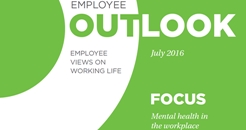 Mental health in the workplace
Mental health in the workplace
From a report by Chartered Institute of Personnel and Development (CIPD)
The importance of supporting people’s mental health at work has slowly but surely gained recognition in the UK over the past few years, and with very good reason. The most recent large-scale survey of adults living in England found that nearly one person in four (23%) had at least one psychiatric disorder (Health and Social Care Information Centre 2009). This stark statistic means that a much higher proportion of people in work must be suffering from common mental health disorders, such as anxiety and depression, than has probably been assumed by most employers.
CIPD commissioned YouGov to survey over 2,000 employees in June 2016 to identify their experiences and attitudes about mental health in the workplace. Here is an abridged version of the key findings:
The state of people’s mental health at work
Overall, across the UK, almost three out of four employees (74%) describe their current mental health as good or very good and one-fifth believe it is moderate (21%). Just 5% of employees say their mental health is poor or very poor. However, a much higher proportion have experienced poor mental health at some stage of their life: in response to the question, ‘have you ever experienced mental health problems while in employment?’, three respondents in ten (31%) said that they had.
Demographic and sectoral variations in mental health
Women are less likely to describe their mental health currently as very good (28%) compared with men (33%). The only significant variation according to age is the 55-plus age group, with employees aged 55 and over reporting a lower prevalence of mental health problems (23%). Workers in the voluntary sector are more likely to report that they have ever experienced a mental health problem while in employment (46%), followed by public sector employees (36%), while private sector employees (28%) are least likely to have experienced poor mental health previously.
The impact of poor mental health at work
Half (50%) of respondents who describe their mental health as poor have taken time off work for this reason but, conversely, half (49%) of those experiencing poor mental health have never taken time off because of it.
95% report that poor mental health affects their performance at work as follows:
-
Finding it difficult to concentrate (85% of respondents)
-
Taking longer to perform tasks (64%)
-
Difficulty in making decisions (54%).
-
Struggle to juggle a number of tasks (48%)
-
Less patient with customers or clients (48%).
Supporting good mental health
Less than half of respondents (46%) report that their organisation supports employees who experience mental health problems very well or fairly well, while one in five (20%) say that their organisation supports such employees not very well or not at all.
Public and voluntary sector organisations are far more likely to support employees who experience mental health problems.
The top five types of provision provided by employers to support people with mental health problems are:
-
Phased return to work (32% of employees)
-
Access to flexible working (30%)
-
Access to occupational health services (27%)
-
Access to counselling services (27%)
-
Employee assistance programme (19%).
Just 10% of organisations provide training for line managers in managing and supporting people with mental health problems.
Fostering an open culture around mental health
Almost four respondents in ten (38%) believe that their organisation has an inclusive working environment in which staff are encouraged to talk openly about their mental health problems. Public and voluntary sector organisations are more proactive.
Building a culture to support disclosure
In all, just over two in five (44%) employees would feel confident disclosing unmanageable stress or mental health problems to their current employer or manager.
What are the causes?
54% say a combination of problems at work and outside of work in their personal life.
37% say problems outside in their personal life
Only 7% say problems at work.
Download the report from here
Hasn't the Church got something to offer here in terms of offering a chaplaincy type service to local workplaces? Also Christians in the workplace could start regular sessions on stress and other issues - see my previous blog on social action in the workplace.
Retweet about this article:
From a report by CIPD, 31/08/2016